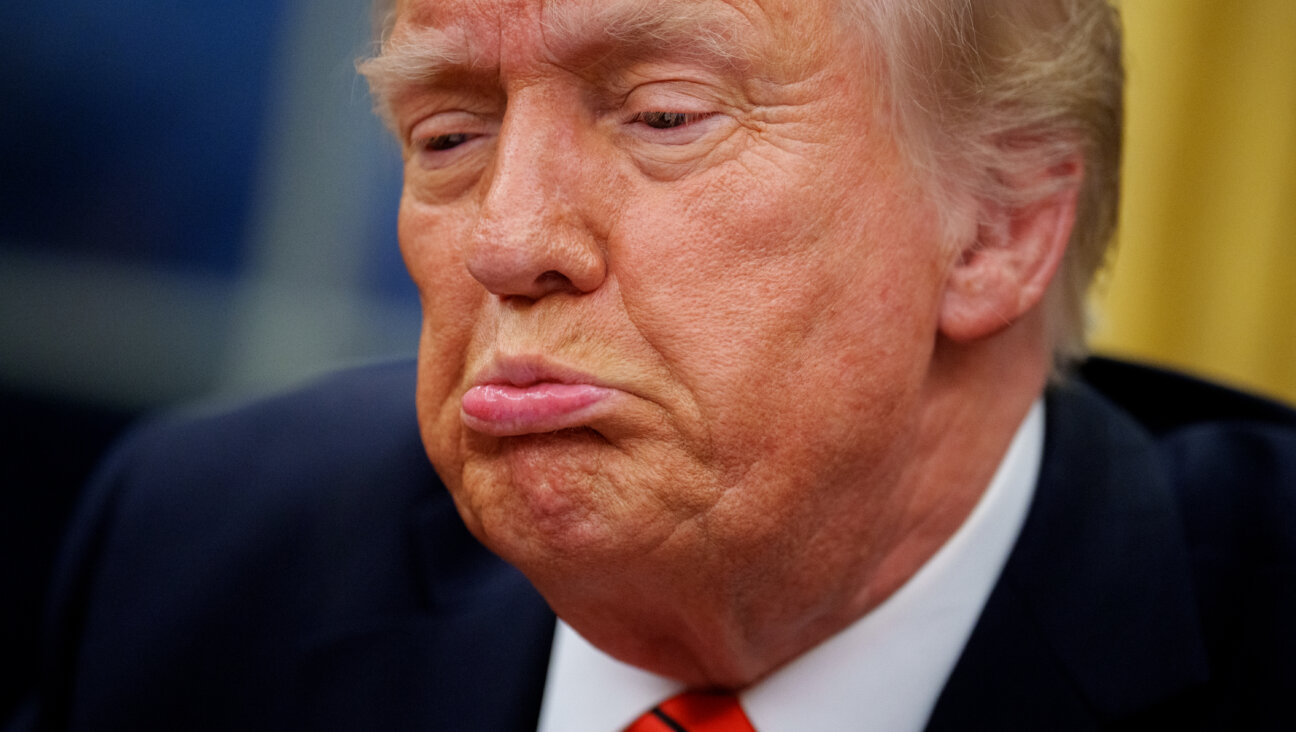The Case Against Impeaching Trump

Image by Getty Images
President Trump seems to be rapidly approaching a political precipice. There is no longer any doubt that Russians interfered in the 2016 U.S. presidential election; the only question that remains is how much the Trump campaign – and Trump himself – knew about it. If the Mueller investigation can prove that Trump knew of the meddling, Trump will prove guilty of collusion, a crime that might lead some lawmakers to pursue his impeachment.
Many on the left seem to vacillate between waiting with bated breath and outright calling for impeachment. But I think this approach is dangerously misguided. Liberals especially should be hoping that Trump is cleared of all charges.
Of course, if Trump committed an impeachable offense, defined by the Constitution as “treason, bribery, or other high crimes and misdemeanors,” he must answer for it.
But what constitutes an impeachment-worthy action is actually up for interpretation. As Michael J. Gerhardt, professor of constitutional law at University of North Carolina’s law school, has written, for Alexander Hamilton writing about impeachment in The Federalist Papers, it was crucial that there be no preexisting list but rather, “that subsequent generations would have to define on a case-by-case basis the political crimes serving as contemporary impeachable offenses.”
This insistence that each congress decide for itself what constitutes an impeachable offense has to do with the nature of impeachment, Gerhardt explained to me over the phone. “Presidential impeachment almost always is politically motivated to some extent,” he said. “We expect that politics and partisanship are going to play a role. What’s important is to be able to determine a basis that is not political, that may be grounded in fact, and may rise to the level of impeachable offense.” It was also the reason Hamilton didn’t give the power to impeach to the Supreme Court, because impeachment could not by its nature be “tied down” by strict rules.
That there’s always an inherently political facet of impeachment is why the Founding Fathers made it so hard to accomplish, safeguarding the process by giving Congress the sole power of impeachment, and the Senate the sole power to try impeachments, with a supermajority of two-thirds necessary to convict.
“We don’t put that authority in one place,” Gerhardt explained, “to prevent people from pushing out the president just because they don’t like him. You need a pretty strong basis, some degree of bipartisanship, to support removal.”
Impeachment is also meant to be not a punishment for a crime, but rather a special sanction. Not all crimes are impeachable, and not all impeachable offenses are crimes. Impeachment is specifically a tool to keep a president from abuses of power that seem likely to occur in the future, Greg Weiner, political scientist and author of “Madison’s Metronome: The Constitution, Majority Rule, and the Tempo of American Politics,” wrote in The New York Times. “The purpose of impeachment is not punitive. It is prophylactic,” he wrote. Unlike criminal law, which looks backward toward offenses already committed, the object of impeachment is not revenge. “It is to protect the public against future acts of recklessness or abuse,” Weiner noted.
Nothing Trump has done in the past – not violating the emoluments clause, not his having potentially violated campaign laws in silencing Stormy Daniels, not the sexual assault of dozens of women, not his general unfitness for office – is a guaranteed or even likely cause of impeachment.
“So far I haven’t seen evidence of impeachable offenses,” says Ross Garber, a lawyer whose clients have included three governors facing impeachment proceedings. “A lot of people focus on ‘high crimes and misdemeanors,’ but you have to look at that in relation to treason and bribery,” he said. “Those are examples of the kinds of serious official conduct that can warrant impeachment.”
Most crucially, impeachment is never supposed to be a substitute for an election, Gerhardt says, and this makes it already a difficult sell in Trump’s case, precisely because of the intensity of the liberal outrage and hatred toward him. “A number of people began with the view that Trump was illegitimate and shouldn’t be in the presidency and a lot of what he’s done is being protested as an abuse of power,” Gerhardt said.
It makes it difficult to determine whether these protests are grounded in fact or in political discontent, difficult to distinguish what’s a real abuse of power and what’s a perceived abuse of power that’s really just someone you disagree with being in power.
In fact, grounds for impeachment come down to precisely this question, Gerhardt says: Has there been a serious abuse of power? Has there been treason, bribery or any other high crimes or misdemeanors? Has the president ever had a relationship with another country that undermined American interests? Has he entered an illegal treaty?
In other words, it comes down to a question of interpretation.
Given the bipartisanship necessary, it seems highly unlikely that Trump will be impeached. But more importantly, given how political, subjective, and speculative impeachment is, I believe that he shouldn’t be – and that especially liberals should be safeguarding him against it.
For starters, impeachments are by definition destabilizing, says Garber. “During an impeachment process, it’s very difficult for the government to accomplish other important work. So much attention and so much focus is devoted to the impeachment that it doesn’t leave a lot of bandwidth for anything else.”
This doesn’t mean impeachment should never be pursued. There are certainly situations that warrant it. And yet, both the text of the Constitution and its history, as well as how it’s been applied, suggest the importance of incredible caution before Congress should contemplate heading down that road.
But equally important is the fact that as of March 16, 31% of the American people said they “strongly approve” of the job Trump is doing as president. And for this third of our body politic, an indictment would not be seen as evidence of Trump’s guilt. Instead, it would be seen the way Trump wants it to be seen, as evidence that the system is rigged against him, and has been since he won the election.
In other words, for a third of our nation, impeachment would look like the losers of a democratic process using means other than democratic elections to unseat their fairly won candidate.
The distrust that impeachment would create in one third of our nation is something it will take generations to buy back. And to the extent that this can be avoided, I believe it absolutely must be, and not only for the health of our nation.
For if impeachable offenses must be interpreted subjectively, and if the process is an admittedly politicized one, then in a sense, Trump’s base is right – as is Trump himself – that impeachment would represent an assault against the president of a political nature, at least, according to Hamilton.
This of course doesn’t mean that there are no conditions under which Trump should be impeached. There are certainly things Mueller could find that would justify Trump’s removal from office, or at least, would justify Democrats trying to convince Republicans to join them in pursuing such measures.
But Hamilton’s point is that even a justified impeachment is only ever initiated by one’s political enemies, not by the judiciary but by the legislative branch. In other words, impeachment is an inherently partisan affair, though one that requires overcoming partisanship for it to be successfully deployed to its conclusion.
Given how divided our society currently is, every legal effort must be made to avoid impeachment.
My point is not that there should be no legal checks on Trump because a minority of the nation supports him. Indeed, Trump’s approval rating is lower than any of the most recent seven president’s, and he failed to get the popular vote by 3 million votes.
I’m arguing that absent actions so treasonous that Republicans, too, would be forced to impeach, the fact that the Republicans will probably never let Trump be impeached and will not enable liberals to overcome the hurdle of bipartisanship is actually a good thing for the nation as a whole.
For they are giving us a chance to reclaim our citizenry. And instead of pursuing impeachment, we should be doing just that, focusing on reestablishing trust in the institutions that Trump’s base views as partisan.
Of course, for many liberals, Trump’s base is a lost cause. In the aftermath of the election, liberals were divided over whether Trump’s base supported him for economic reasons, which were excusable, or for basic racism and misogyny, which were not. And the responses were divided respectively regarding whether or not his supporters were worth saving.
The problem is, either way, we’re stuck with them.
The American model of nationalism is one of the few in the world that’s based on citizenship rather than ethnicity or national origin. It’s something many of us, myself included, are very proud of. But this model has to be protected through good citizenry, which means, protecting that which unites us as a body politic, rather than throwing those we disagree with out the window. Because of our model of nationhood, our American Other is not Muslims, as in Europe, or non-Jews, as in Israel. It’s Trump supporters. And if we seriously believe that our nation is one of equal citizens, we have to start doing the work of citizenry, which is the work of not giving up on those we disagree with.
We still share a lot with our Trump-supporting brethren, after all. Yascha Mounk put it well in a recent piece in The New York Times when he distinguished between patriotism and nationalism. Patriotism or inclusive nationalism is “a state in which all members have the same rights and opportunities irrespective of the group into which they are born or the culture to which they belong. It is a society in which people feel that they have something important in common because they seek to govern themselves together,” he wrote.
We can — and should — certainly be doing a lot more to ensure the equal rights and opportunities irrespective of group, especially where minorities and the incarcerated are concerned. But it is self-governance that’s most threatened by a polarized society. As Anand Giridharadas put it in The Huffington Post, “we are turning into a society so perpetually offended by one another that we are less and less capable of actually arguing about our future,” he writes. “And citizens who cannot argue are begging to be ruled.”
In a recent piece in The New York Times Book Review, Andrew Sullivan argued just the opposite. Because of the Republicans’ sycophantic attachment to Trump, we now have a situation where “an unimpeachable president is slowly constructing the kind of authoritarian state that America was actually founded to overthrow.”
But every American president has proved unimpeachable. As Garber put it: “The fact of the matter is, no president in our history has ever been removed from office for anything. Two have been impeached, but both were acquitted in the Senate.”
In Trump’s case, I believe that the Republicans are (for a change) saving Democrats from their own baser instincts.
Gerhardt for his part doesn’t agree with me. “The odds are quite good that whatever happens, a chunk of the American public wouldn’t support the outcome,” he told me. And you could have made the same argument about the Clinton impeachment, that a sizable chunk of the American public thought it was political and partisan, though there was a strong basis for proceeding with Clinton’s impeachment.
“There are sharp enough divisions among the American people regardless of the impeachment process,” he said. “It wouldn’t bring more people together; we’re already pretty divided.”
To an extent I agree. A lot more is necessary to heal the rift in the American body politic. But backing away from a politicized removal of 31% of our nation’s choice for president is a start.
Batya Ungar-Sargon is the opinion editor of the Forward. Email her at [email protected].























